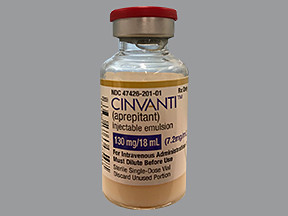APREPITANT - INJECTION
PHONETIC PRONUNCIATION: (a-PRE-pi-tant)
COMMON BRAND NAME(S): Cinvanti
GENERIC NAME(S): aprepitant
Uses
USES: Aprepitant is used with other medications to help prevent nausea and vomiting caused by cancer drug treatment (chemotherapy). It works by blocking one of the body's natural substances (substance P/neurokinin 1) that causes vomiting.
How to use APREPITANT - INJECTION
HOW TO USE: Read the Patient Information Leaflet if available from your pharmacist before you start using this medication and each time you get a refill. If you have any questions, ask your doctor or pharmacist. This medication is given by injection into a vein by a health care professional. It is given as directed by your doctor, usually 30 minutes before the start of chemotherapy. Your doctor may direct you to also take another form of this medication by mouth for the next 2 days. Follow your doctor's instructions carefully. If you have any questions, ask your doctor or pharmacist. Tell your doctor if you vomit or have nausea.
Side Effects
Precautions
Interactions
Overdose
Images
Reviews
Faq for APREPITANT - INJECTION
Aprepitant injection is used to prevent nausea and vomiting caused by chemotherapy treatment.
Aprepitant works by blocking the actions of certain chemicals in the brain that trigger nausea and vomiting.
Aprepitant injection is given by a healthcare professional as an infusion or injection into a vein.
Common side effects of Aprepitant injection may include fatigue, constipation, diarrhea, headache, and dizziness.
Aprepitant injection has a half-life of about 9 to 13 hours, meaning it takes that amount of time for half of the drug to be eliminated from the body.
It is important to inform your healthcare provider about all the medications you are currently taking, as Aprepitant may interact with certain drugs, including those metabolized by the liver.
It is best to consult with your healthcare provider if you are pregnant or breastfeeding before receiving Aprepitant injection, as its safety in these situations is not well-established.
The frequency of Aprepitant injections may vary depending on the specific chemotherapy regimen and individual patient factors. Typically, it is given for a few days in conjunction with chemotherapy, but the exact dosing schedule should be determined by a healthcare professional.
There are no specific dietary restrictions associated with Aprepitant injection. However, it is always advisable to follow a healthy and balanced diet while undergoing chemotherapy treatment.
Disclaimer
IMPORTANT: HOW TO USE THIS INFORMATION: This is a summary and does NOT have all possible information about this product. This information does not assure that this product is safe, effective, or appropriate for you. This information is not individual medical advice and does not substitute for the advice of your health care professional. Always ask your health care professional for complete information about this product and your specific health needs.

No Reviews Yet